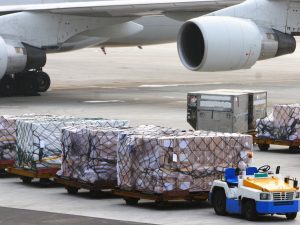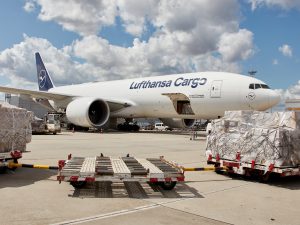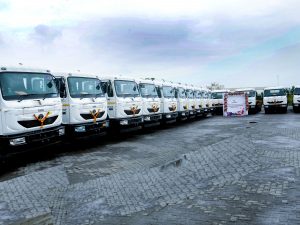Not even zero growth in November and December can disrupt the global air cargo market from landing a year of unexpected double-digit demand growth in 2024. Healthy volumes of +11% in October and spot rates up +19% year-on-year reflected the growing maturity and balance among buyers and sellers of air cargo capacity, according to the latest market data by Xeneta. A year of constant, unexpected disruptions outside of the industry’s control – which began with a growth forecast as per October 2023 of +1-2% for the full 2024 – is now firmly on course to end on a high in terms of demand. Such conditions traditionally result in winners and losers, but lessons learned and applied by shippers, freight forwarders, and airlines “shows the industry at its best,” says Niall van de Wouw, Xeneta’s Chief Airfreight Officer. “The frequency and diversity of ‘storms’ coming the way of the air cargo industry in 2024 mean this year could have been quite messy, but the industry has found a way to navigate these challenges,” he said. “This shows the prep work has paid off as well as the flexibility shown in the industry. We see more emphasis on maintaining relationships than squeezing every last dime of revenue.” While October’s global air cargo spot rate continued to stay elevated – averaging USD 2.68 per kg and just a few cents below 2023’s peak season high – the growth momentum slowed down from +25% in September, due mostly to a high comparison base in October 2023. In terms of the month-on-month trend, October’s spot rate was relatively flat compared to September. The elevated year-on-year growth spot rate was supported by continued double-digit growth (+11%) …
Read More »Lufthansa Cargo boosts freighter capacity to Mumbai, Chennai
Lufthansa Cargo has released its new winter flight schedule which features its freighters serving up to 17 destinations across Asia. The airline has now boosted its capacity in top Asian cities which includes the likes of Mumbai, Chennai, and Hyderabad, said in LinkedIn post. The airline has now increased one weekly flight to Mumbai and Taipei. Chennai will now be served twice a week in combination with Hyderabad or Mumbai. Lufthansa Cargo will carry out a total of 50 weekly freighter frequencies to Asia as per its newly released winter schedule. The airline has also launched a transpacific flight, connecting Frankfurt, Ho Chi Minh City, and Los Angeles, which would ensure a direct connection from Asia to U.S.A, offering faster and high-quality transit.
Read More »Qantas Freight, Freightos collaborate to streamline operations
Qantas Freight and Freightos have joined hands to enable freight frowarders to explore, and book capacity across Freightos platforms (Webcargo and 7LFreight) for Qantas Network across US, Australia, and New Zealand. Through this strategic partnership between Qantas Freight and Freightos, forwarders can access instant rate quotes and bookings for ground and air providers, including LTL shipments, domestic US air cargo, and international air cargo on a single platform. WebCargo now provides services to 55 carriers, representing nearly 70% of global air cargo capacity.
Read More »Octoloop connects 10 new cities for faster cargo deliveries
Octoloop powered by CargoFlash, now connects its platform from 10 new main cities – Ahmedabad, Goa, Chennai, Calcutta, Bangalore, Chennai, Amritsar, Hyderabad, Cochin, and Trivandrum, apart from existing stations, Delhi and Mumbai, empowering businesses in these cities to access Qatar Airways Cargo’s extensive global network. This partnership marks a significant milestone in our mission to simplify cargo logistics and empower businesses in India with more efficient global reach. By expanding to these 12 key cities, we’re making it easier than ever for businesses to connect with the world, leveraging our intuitive platform and Qatar Airways Cargo’s trusted network helps airlines to expand their reach and network across India.
Read More »DP World launches new with ESC tech to boost efficiency
DP World launches new fleet of prime movers, equipped with advanced Electronic Stability Control (ESC). This cutting-edge technology provides enhanced stability, ensuring that drivers remain safe and in control, even in difficult road and climatic conditions. Additionally, the new fleet also comes equipped with a Tail Guarding System, which prevents reverse collisions by eliminating blind spots, using proximity sensors to stop the vehicle when necessary. Through the implementation of these state-of-the-art advanced safety features, DP World is ensuring a safer, more efficient working environment for its drivers, reinforcing its dedication to operational excellence and the welfare of its team. Ravinder Johal, Chief Operating Officer, Ports & Terminals, Operations & Commercial, Middle East, North Africa & Subcontinent, DP World, said, “The safety and security of our cargo and truckers are our top priorities. By incorporating advanced technology in our new fleet of trucks, we are proud to support the government’s vision for enhanced road safety. We are committed to continuously improving our safety standards, ensuring our drivers are protected, and reducing the potential impact of accidents. We believe this approach will inspire broader adoption of safety practices across the industry.” The introduction of Prime Movers equipped with Electronic Stability Control (ESC), combined with an Anti-lock Braking System (ABS), enhances vehicle safety and performance, while providing safety to truckers and all its operational staff. This advanced safety system will ensure superior stability, particularly when transporting high-risk cargo at high speeds. ESC automatically corrects sideways drift during overtaking, adjusts engine torque, and applies selective braking to maintain stability during turns. It is especially beneficial in challenging weather conditions, providing optimal control and safety on slippery roads.
Read More »Softlink Global expands in Chennai to drive operational efficiency
Softlink Global expands its office space in Chennai as part of Softlink’s growth strategy, designed to enhance service efficiency by providing closer proximity to clients, reducing response times, and tapping into the local talent pool. Proximity with Softlink’s Mumbai HQ will also contribute significantly for collaboration and meeting the specific needs of South India. Amit Maheshwari, Founder and CEO of Softlink Global, emphasized the significance of the new office, stating, “The opening of our larger Chennai office represents our vision to bring superior technology solutions closer to our customers in South India. Coordinating closely with our headquarters in Mumbai, the Chennai team will drive efficiency and productivity in the region while working in tandem with our other offices to ensure a cohesive approach to achieving our strategic objectives.” “Our vision for the future of logistics goes beyond merely expanding office spaces. We are committed to advancing logistics technology through ongoing product innovation and skill development via Softlink Academy. With a three-decade legacy of progress, our focus remains on preparing ourselves and our partners for the future,” added Amit. Notable personalities attended the inauguration ceremony, including R. Srinivasa Naik, Principal Commissioner of Customs, Airport Chennai, G. Raghushankar, Executive Director of International Clearing & Shipping Agency (India), CMR Ananth Sairam, PRO CCBA and Partner at M/s Chettinad Sairam Logistics, RN Sekar, President of CCBA and Proprietor of Trident International, S. Nataraja, Secretary of CCBA and Proprietor of Paramount Forwarders and Divakaran Nair, Vice President of CCBA and Director of Transpower Maritime India along with partners, employees, and industry representatives. Demonstrating the importance of the occasion, Softlink Global’s Founder & CEO Amit Maheshwari, Chief Growth Officer Kunal Maheshwari and Director Arun Ashan …
Read More »‘It aims to enhance multi-modal connectivity, addressing critical gaps in infrastructure such as underdeveloped roads and inefficient ports‘
Kamesh Peri, CEO, Celebi Delhi Cargo Terminal Management India says, “The initiatives like PM Gati Shakti and the National Logistics Policy (NLP) have clear goals and are poised to transform India’s cold chain sector. The PM Gati Shakti-National Master Plan aims to enhance multi-modal connectivity, addressing critical gaps in infrastructure such as underdeveloped roads and inefficient ports. This initiative, along with the NLP’s focus on reducing logistics costs from 13-14% of GDP to 8%, will drive the growth of the cold chain market, potentially increasing its value from Rs 2 lakh crore in 2023 to Rs 5 lakh crore by 2032. Granting infrastructure status to warehousing and cold chains ensures better credit flow, further supporting this growth. Moreover, digital initiatives like the Unified Logistics Interface Platform (ULIP) offer real-time tracking and transparency across the supply chain. This enhances efficiency and reliability, essential for temperature-sensitive cargo. Innovations such as active and passive cold chain solutions, ice batteries and cube packaging improve temperature control and product preservation, crucial for reducing spoilage and maintaining quality. These comprehensive measures collectively strengthen the cold chain infrastructure, ensuring a more resilient and efficient logistics network in India.”
Read More »‘PMGS can reduce logistics cost significantly, & improve delivery times’
Vinet K Chadha, MD, Combined Logistics Solutions says, “PM Gati Shakti Master Plan is a very important initiative for developing country like India. It is targeting the ideal and the perfect sectors which will boost manufacturing like electronics, renewable energy , pharmaceuticals etc . At its core, the plan focuses on enhancing our infrastructure and logistics. By improving transportation networks—such as roads, railways, and ports—we can significantly reduce logistics costs and delivery times, making our manufacturing sector much more competitive. This will also make an attractive proposition for businesses to set up their warehouse in India, ultimately positioning India as a global manufacturing hub.” National logistics policy – One of the most notable impacts will be the reduction of logistics costs, which currently account for a substantial percentage of GDP. Another key impact is the integration of technology and digital solutions into logistics operations. Incorporating sustainability , will make India green in the logistics sector well and will also keep India up to date with the world trends. The world is moving towards “Smart logistics” and now so will India. Both of these initiative’s impact will be seen long-term. Despite being the 5th largest economy in the world , India is still a developing nation – Its journey towards a developed country will definitely be fast forwarded through these master plans.
Read More »TIACA, KSIA sign MoU to enhance global cargo & logistics ops
The International Air Cargo Association (TIACA) signed MoU with the King Salman International Airport (KSIA) to collaborate towards enhancing the profile of cargo and logistics within the region and globally by leveraging the irrespective strengths towards promotion, training and capacity building, innovation, and sustainability leadership. The primary objective of the MoU is to support the profile of cargo and logistics within the region and also globally. “This signing of this MoU is important to the industry as it signals the strong support of the association’s mission not only to unite the industry but to set the vision for the air cargo industry, disseminate and enhance knowledge and promote and encourage business, social and technological innovation. We are excited to get to work with our colleagues at KSIA and appreciate their vision to further air cargo not only within their region but also globally.” stated Steven Polmans, TIACA Chair. Marco Mejia, Acting CEO of KSIADC, said: “This strategic membership marks a significant milestone for KSIA and its partners as they collectively strive to enhance Saudi Arabia’s position as a global logistics powerhouse. KSIA remains dedicated to its mission of delivering a world-class airport, logistics, and cargo solutions; and fostering Saudi Arabia’s economic development.” “Over the last few years, TIACA has been focused on spotlighting the importance of air cargo across the globe, the training of the future of the next leaders, creating a sustainable future and shining a light on innovation within the industry. The signing of this MoU couldn’t be more of a natural step and we look forward to working with KSIA to accomplish the tasks at hand.” stated Glyn Hughes, Director General, TIACA.
Read More »DHL, IAG Cargo solidify partnership to drive sustainable air freight
DHL Express and DHL Global Forwarding are furthering their sustainability goals through a contract renewal with IAG Cargo, to use an additional 60 million liters of Sustainable Aviation Fuel (SAF) on behalf of DHL. The new contract covers 2024 and 2025 emissions and will result in a reduction of greenhouse gas emissions of approximately 165,000 metric tons of CO2e. The annual emissions reduction would be equivalent to removing a B747-400 freighter from DHL’s intercontinental operations from the UK to US – which makes the partnership the largest SAF agreement between an airline and a customer to date and underlines DHL’s leading role in sustainable air freight solutions. The SAF used in this collaboration is certified by International Sustainability & Carbon Certification (ISCC) and is derived from sources such as used cooking oil and food waste. Compared to conventional jet fuel, this type of SAF has been proven to achieve around 80% lower lifecycle emissions. The SAF used will mainly be delivered to London Heathrow. “We strongly believe that collaboration is the foundation of a more sustainable future. Both DHL and IAG Cargo share a strong commitment to carbon footprint reduction. We are pleased that we can now mark another milestone on our journey towards more sustainable air freight,” said Travis Cobb, EVP Global Network Operations & Aviation at DHL Express.
Read More » Cargo Breaking News
Cargo Breaking News









